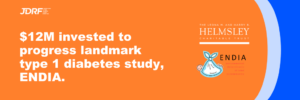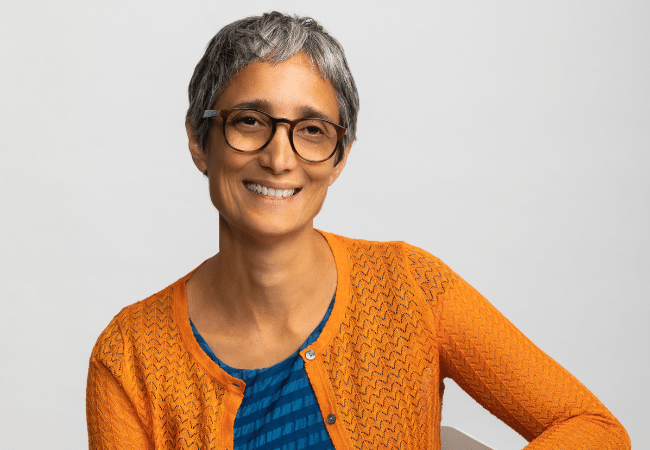$12M invested to progress landmark ENDIA study

MEDIA RELEASE
Australia leading type 1 diabetes research with $12M invested to progress landmark study
The funding will support the extension of ENDIA, a world-first study seeking to understand the role of environmental triggers from as early as pregnancy for the onset of type 1 diabetes (T1D).
4 April 2023: JDRF Australia and funding partner The Leona M. and Harry B. Helmsley Charitable Trust (Helmsley) have announced a combined additional $12M towards the continuation of the Environmental Determinants of Islet Autoimmunity (ENDIA) study.
The ENDIA study, led by Professor Jennifer Couper from the Women’s and Children’s Hospital and the University of Adelaide, is the world’s first and largest study to identify how genetics and the environment interact from pregnancy through early childhood to drive or protect against the development of T1D, a life-long autoimmune condition that destroys the body’s cells that make insulin.
Over the last 10 years, almost 1,500 Australian children with an immediate family member living with T1D have been recruited to the ENDIA study and followed from the pregnancy into childhood to investigate why some children develop T1D while others do not.
The first stages of T1D can be detected in the first few years of life, so interventions to prevent T1D need to begin early, perhaps even before birth.
JDRF’s support of the study has been made possible through the JDRF Type 1 Diabetes Clinical Research Network (T1DCRN), a government-funded network that brings together world-class T1D researchers.
Minister for Health, Hon. Mark Butler MP, says that the announcement is testament to the Government’s commitment to T1D and JDRF:
“The Albanese Government has a longstanding history with JDRF and has seen first-hand the benefits their research programs, like ENDIA, drive for the community.
“It’s wonderful to see that Helmsley also recognise the importance of long-term investment in research through JDRF’s Clinical Research Network to prevent autoimmune diseases like type 1 diabetes.”
JDRF Chief Scientific Officer, Dr Dorota Pawlak, says that ENDIA has been instrumental in positioning Australia as a global leader for T1D prevention.
“ENDIA was the first study of its kind in the world and is increasingly recognised as the gold standard for understanding how gestational and early life exposures influence the onset of type 1 diabetes.
“These advancements have been made possible thanks to funding from the Government and the generosity of the Helmsley Charitable Trust.”
The $12M investment builds on eight years of partnership, with a total commitment to date of $40M to ENDIA: $13M from the T1DCRN, and $27M (US$20M) from Helmsley.
Dr Anne Koralova, Program Officer at the Helmsley Charitable Trust, says that ENDIA represents the research progress made possible through longstanding collaboration:
“At Helmsley, we are committed to building a future where we can identify those at risk for type 1 diabetes and provide interventions to prevent disease development in the first place.
“That’s why we are invested in ENDIA — their research holds great promise to make that future a reality.”
Many factors such as viral infections, bacteria in the gut, the immune system, nutrition, and more, can interact with our genes to make some children more likely to develop T1D. ENDIA aims to understand how these interactions influence the progression of the condition.
Professor Couper, ENDIA Principal Investigator, Paediatric Endocrinologist at the Women’s and Children’s Hospital and Head of the Discipline of Paediatrics at the University of Adelaide, says that the study’s over-arching purpose is to develop treatments to prevent childhood T1D.
“ENDIA has brought together expertise in Australia to provide the best chance of discovering what drives type 1 diabetes in early life. Recently, our funders have extended invitations for researchers world-wide to access ENDIA data and samples, creating exciting opportunities for collaboration. Additionally, ENDIA is committed to improve the health of expectant mothers with type 1 diabetes, and their babies.”
The study has also provided immediate benefits to 21 children who have been diagnosed early with T1D through the study, as well as a further 189 children who have been identified to be at heightened risk. Early diagnosis — identifying those with early signs of disease before symptom onset — can help prevent complications often seen at childhood T1D onset like severe diabetic ketoacidosis (DKA)*.
Professor Anton Middelberg, Deputy Vice-Chancellor and Vice-President (Research), the University of Adelaide, said:
“Professor Couper’s research into the prevention of type 1 diabetes is expected to have a major positive impact for people across Australia.
“The University of Adelaide prides itself on being a magnet for attracting and retaining talent who together produce world-leading research that solves real-world problems.”
So far, ENDIA has brought together researchers from ten Australian universities, five Medical Research Institutes, and nine tertiary hospitals across five States and their international collaborators, with the shared goal of understanding and preventing T1D.
The additional $12M investment will support the continuation of ENDIA for a further three years and create opportunities for leading experts around the world to collaborate and accelerate new T1D discoveries.
-ENDS-
*Diabetic Ketoacidosis (DKA) is a life-threatening diabetes complication where the body produces excess blood acids (ketones), that occurs when there is not enough insulin in the body.
Media enquiries
Emma Shipley
Communications & Sponsorship Manager, JDRF Australia
E: eshipley@jdrf.org.au
P: 0434 623 510
About JDRF Australia
JDRF is the leading research, advocacy and community organisation focused on type 1 diabetes (T1D) globally. JDRF Australia connects the leading individuals in every discipline, industry, and organisation with a single focus of creating a world without T1D.
Our mission is to accelerate life-changing breakthroughs to cure, prevent and treat T1D and its complications. To accomplish this, JDRF has invested nearly $2 billion since our inception.
We collaborate with academic institutions, policymakers, and corporate and industry partners to develop and deliver a pipeline of innovative therapies to people living with T1D.
Our staff and volunteers in seven countries are dedicated to advocacy, community engagement and our vision of a world without T1D.
About The Leona M. and Harry B. Helmsley Charitable Trust
The Leona M. and Harry B. Helmsley Charitable Trust aspires to improve lives by supporting exceptional efforts in the U.S. and around the world in health and select place-based initiatives. Since beginning active grantmaking in 2008, Helmsley has committed more than $3.5 billion for a wide range of charitable purposes. The Helmsley Type 1 Diabetes (T1D) Program is the largest private foundation funder in the world with a focus on T1D, with more than $1 billion to date committed to transform the trajectory of the disease and to accelerate access to 21st century care, everywhere. For more information on Helmsley and its programs, visit helmsleytrust.org.




